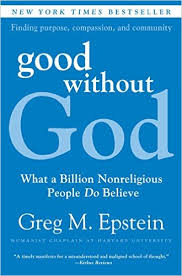Good Without God by Greg M. Epstein, the humanist chaplain at Harvard University. Epstein maintains that the over one billion people who are non-religious, atheist, or Humanist are part of a long proud tradition and that religious and non-religious alike will benefit from better understanding the tradition of seeking goodness without God. He writes in a very engaging, lyrical, and sometimes poetic style. In addition to bolstering arguments that people have the capacity for goodness even in the absence of belief in God, the author gives a brief history of some notable people who aligned with Humanist thinking long before the term was coined.
True historians may see his presentations of historic figures as simplistic, but I appreciated his Short Campus Tour of the University of Humanism chapter as an introduction to groups who have lived by Humanist beliefs, including the followers of Epicurus who wrote, “Nothing to fear in God; Nothing to feel in Death; Good can be attained; Evil can be endured.” Epstein maintains that this still works today as a Humanistic credo. He explains that Nihilism, the sentiment that life has no meaning, does not equate with Humanism and also presents Humanism in compassionate comparison to the neo-atheism that is recently expounded by authors like Christopher Hitchens and Richard Dawkins. Epstein’s mission is to call on Humanists to act together for their own good and for the greater good, and to come together in the same ways that religious people do. He envisions a movement that will someday change our world.
This book is a good introduction to Humanism and also provides resources for further information, including “Humanism and its Aspirations” – a contemporary statement of beliefs and principles about what Humanism can be and is today. Many of these overlap with our UU principles. I first picked up this book because I was intrigued by the title and I’m glad I did. It helped to broaden my understanding of the spectrum of spiritual beliefs and may be of use to those, like me, who are trying to figure out and articulate where they fit on that spectrum.
Lorraine Olendzenski, January 2013

